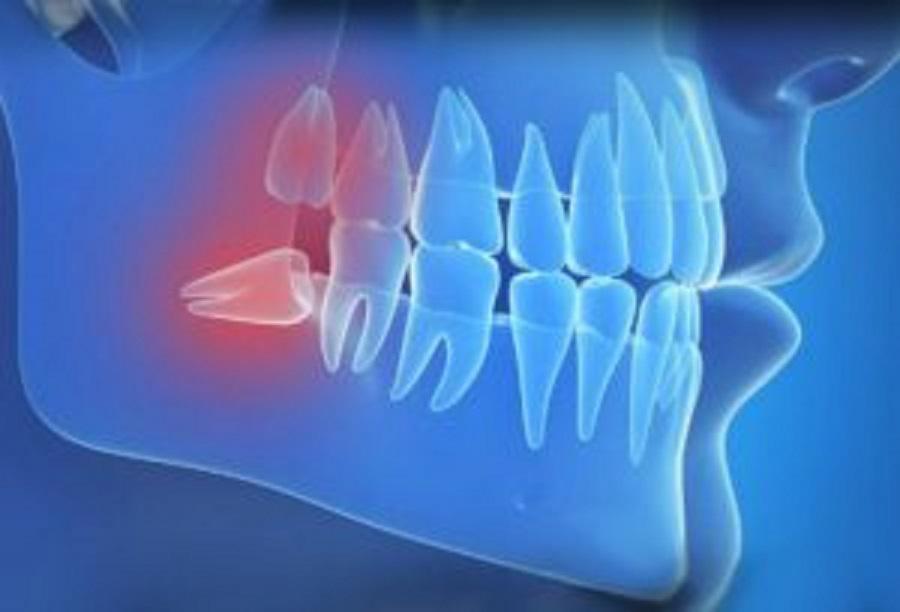
Wisdom teeth are the third set of molars and the last four of your 32 teeth to erupt/come in. Wisdom teeth typically erupt between the ages of 17-24. However, it is not uncommon to have wisdom teeth erupt earlier or later in life.
Nowadays wisdom teeth tend not to be useful and commonly cause issues; however, they were once useful for our distant relatives. Back when our ancestors ate rough food and had no dental care, teeth commonly wore down or fell out by early adulthood. Functioning as replacement teeth, wisdom teeth would grow in and take the place of the teeth that had fallen out. Since we no longer need replacement teeth, wisdom teeth are commonly removed to prevent or stop the progression of wisdom teeth symptoms.
Wisdom Teeth Symptoms:
Many people wonder what it feels like to have your wisdom teeth come in. Wisdom teeth symptoms can range from painless to extremely painful depending on the situation and the person. Common wisdom teeth symptoms include:
- Gum pain
- Swollen gums
- Bleeding gums
- Swelling around the jaw
- Bad breath
- Headaches
- Jaw aches
- Unpleasant taste when eating
- Stiffness of the jaw
- Swollen lymph node in the neck.
Impacted Wisdom Teeth:
When wisdom teeth don’t have enough room to come in correctly, they are considered impacted. There are many different degrees of impaction but overall having impacted wisdom teeth is fairly common – 62-75% of people have at least one impacted wisdom tooth.
Based on where they teeth lay in the jaw you can have soft tissue impaction, partially bony impaction, and complete bony impaction. Soft tissue impaction is where the crown of the wisdom tooth has incompletely broken through the gum leaving it partially exposed and partially covered by gum tissue. Partially bony impaction is where the tooth is partially surrounded by gum tissue and partially still encased in the jaw bone. A complete bony impaction is when the full tooth is encased in the jaw bone. As the degree of impaction becomes worse extraction becomes more difficult and more involved.
Do I Have To Get My Wisdom Teeth Removed?
If you aren’t in pain and your wisdom teeth aren’t crowding your other teeth, causing tooth decay, or in a position that could cause gum disease then you may not need to have your wisdom teeth removed. Some dentists believe that asymptomatic wisdom teeth should still be removed to prevent later complication while others believe that they should only be removed if causing an issue. Studies have not yet determined which belief is correct, so we advise this be a decision you and your dentist make together. If you decide not to get your wisdom teeth extracted, you should have a dentist still monitor them to make sure problems don’t develop.
If you are having wisdom teeth symptoms it is important to see a dentist and get your wisdom teeth evaluated and possibly removed. If left untreated wisdom tooth issues can lead to pain, gum disease, tooth decay, infection, and overcrowding.
Your dentist will most likely recommend wisdom tooth extraction if:
- You are in pain or experiencing the wisdom teeth symptoms mentioned above
- They grew in in the wrong position allowing food to be trapped which can lead to cavities and decay
- Their position makes it difficult to floss or properly clean the molars next to it
- They are partially erupted and susceptible to infections
- They don’t have room to properly grow in
- They have started to crowd or damage neighboring teeth
Wisdom Teeth Extraction:
Wisdom teeth extraction is a procedure usually done by an oral surgeon under local or general anesthesia. Some patients choose to have all their wisdom teeth removed at once while some choose to do a combination such as the lower ones first then the upper ones. If the tooth is fully erupted extraction is just like any other pulled tooth and is very simple. If the tooth is partially or completely impacted the oral surgeon will need to make an incision in the gum tissue to reveal the tooth, then the tooth will be wiggled back and forth until it can be removed from the gum. If the tooth is tightly compacted then it will need to be broken into pieces before it can be removed from the gum/jaw. After the tooth is removed the oral surgeon will then stich up the incision if needed.
If you’re experiencing wisdom teeth symptoms or are interested in discussing the status of your wisdom teeth, schedule a wisdom tooth consult with one of our expert dentists. Request an appointment through our contact form or give us a call today to start getting rid of your wisdom teeth symptoms.

